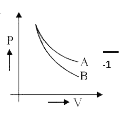A gas expands by a volume ΔV against a constant pressure P. What is the work done by the system?
To solve the problem of calculating the work done by a gas that expands by a volume ΔV against a constant pressure P, we can follow these steps:
1. Understand the Concept of Work Done:
- Work done by a gas during expansion can be defined as the product of pressure and the change in volume. In thermodynamics, this is given by the formula:
W=PΔV
where W is the work done, P is the constant pressure, and ΔV is the change in volume.
2. Identify the Change in Volume:
- In this case, the gas expands from an initial volume V1 to a final volume V2. Therefore, the change in volume can be expressed as:
ΔV=V2−V1
3. Calculate the Work Done:
- Since the gas is expanding, the work done by the system is considered to be negative in thermodynamic terms. Hence, we write:
W=−PΔV
- Substituting ΔV into the equation, we have:
W=−P(V2−V1)
4. Final Expression:
- Therefore, the work done by the gas during its expansion against a constant pressure P is:
W=−PΔV
Final Answer:
The work done by the system is:
W=−PΔV
- Work done by a gas during expansion can be defined as the product of pressure and the change in volume. In thermodynamics, this is given by the formula:
W=PΔV
where W is the work done, P is the constant pressure, and ΔV is the change in volume.
- In this case, the gas expands from an initial volume V1 to a final volume V2. Therefore, the change in volume can be expressed as:
ΔV=V2−V1
- Since the gas is expanding, the work done by the system is considered to be negative in thermodynamic terms. Hence, we write:
W=−PΔV
- Substituting ΔV into the equation, we have:
W=−P(V2−V1)
- Therefore, the work done by the gas during its expansion against a constant pressure P is:
W=−PΔV
The work done by the system is:
W=−PΔV
Topper's Solved these Questions
- CHEMICAL THERMODYNAMICS BOOK - ICSECHAPTER - CHEMICAL THERMODYNAMICS EXERCISE - SHORT ANSWER TYPE QUESTIONS
63 Videos
- CHEMICAL THERMODYNAMICS BOOK - ICSECHAPTER - CHEMICAL THERMODYNAMICS EXERCISE - ESSAY (LONG ANSWER) TYPE QUESTIONS
32 Videos
- CHEMICAL THERMODYNAMICS BOOK - ICSECHAPTER - CHEMICAL THERMODYNAMICS EXERCISE - REVIEW EXERCISES (Fill in the blanks )
6 Videos
- CHEMICAL BONDING AND MOLECULAR STRUCTUREBOOK - ICSECHAPTER - CHEMICAL BONDING AND MOLECULAR STRUCTUREEXERCISE - NCERT TEXT-BOOK EXERCISES ( WITH HINTS AND SOLUTIONS)
47 Videos
- CLASSIFICATION OF ELEMENTS AND PERIODICITY IN PROPERTIESBOOK - ICSECHAPTER - CLASSIFICATION OF ELEMENTS AND PERIODICITY IN PROPERTIESEXERCISE - NCERT TEXT-BOOK. EXERCISE (With Hints and Solutions)
63 Videos
Similar Questions
A gas expands from 4.0 L to 4.5 L against a constant external pressure of 1 atm. The work done by the gas is (1 L-atm = 101.3 J)
View SolutionA gas expands by 2 litres against a constant pressure of 2 atm. Calculate work done in Joule and Calorie.
View SolutionA gas expands by 0.5L against a constant pressure of 1atm. Calculate the work done in joule and calorie.
View SolutionOne mole of an ideal gas is expanded from a volume of 3L to 5L under a constant pressure of 1 atm. Calculate the work done by the gas.
View SolutionA gas can expand from 100mL to 250mL under a constant pressure of 2 atm. The work done by the gas is
View SolutionThe volume of a gas expands by 0.25m3 at a constant pressure of 103Nm2. The work done is equal to
View SolutionWhat is the change in internal energy if 10 J of heat is given to system at constant pressure and 20 J of work is done by the system?
View SolutionA gas expands from 10 litres to 20 litres against a constant external pressure of 10 atm. The pressure-volume work done by the system is
View Solution10 litre of a monoatomic ideal gas at 0∘C and 10atm pressure is suddenly released to 1atm pressure and the gas expands adiabatically against this constant pressure. The final volume (L) of the gas.
View SolutionTemperature of one mole of a gas is increased by 1∘ C at constant pressure. The work done on the system is

View Solution

